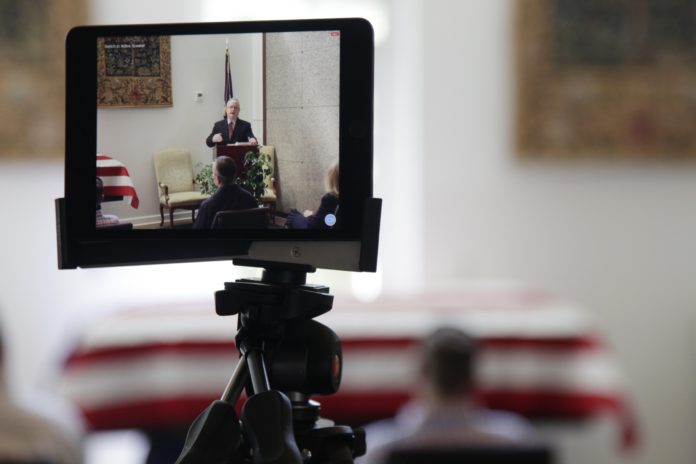
LEXINGTON, S.C. (AP) — No one stands in line to embrace the widow and share memories of her husband of 50 years. No rows of family and friends file toward the flag-draped coffin to pay their last respects. No symphony of sniffles is heard across the room as the minister gives a final prayer.
Instead, a handful of people are scattered across one chapel row as if they’re strangers, not blood. White roses are pinned to empty chairs, representing those who couldn’t be there. An iPad on a tripod livestreams the service for people stuck at home across state lines.
“This is going to be a different experience for all of us,” the minister tells the half-dozen people gathered at a South Carolina funeral home to celebrate the life of J. Robert Coleman, an Army veteran, husband to Gloria, father to three sons and grandfather to three children. “But one thing that will be common is that as we conduct this service today, we’re going to open with a prayer.”
Unspoken was the reason this funeral, and untold others across the world, is different: The coronavirus outbreak, stay-at-home orders and the rules of social distancing are dramatically altering the way families and communities mourn the passing of loved ones.
“It’s hard enough to lose a loved one, but then to have the traditions that usually bring comfort at a time like this seemingly not available just kind of compounds the grief that families feel,” said Justin Baxley, of Woodridge Memorial Park & Funeral Home.
Like most funeral homes, Woodridge is limiting the number of people allowed for services. Many families find it hard to choose which loved ones will be invited to the in-person gathering and which will be relegated to watch via livestream, if at all.
But Coleman’s family said in their case, travel restrictions due to the virus and the nature of their small, close-knit family made following the fewer-than-10-people mandate simple. John Coleman said those who mattered most to his dad were there – his wife, Gloria, and his sons. The only one missing was his beloved dog, Bandit.
“That’s the most important,” Coleman said. “We weren’t brought up to care if we were around a big group.”
Robert Coleman died suddenly last week. One of his sons found him at home in Columbia. The family said he went peacefully, possibly of a heart attack, but because the 69-year-old had complained of chest pain the day before, he was tested for COVID-19.
Days later, the test came back negative. But regardless of the cause of death, funerals still must abide by rules aimed at preventing any possible exposure to the virus.
At Woodridge Memorial Park, a bottle of hand sanitizer and a sign asking guests to kindly refrain from handshaking now sit beside the guestbook. Chairs are spaced apart. Much of the funeral planning among family and staff is done via video chat. And the demand for livestreaming services has skyrocketed.
At Coleman’s funeral, most of his family chose to sit in the front row, but a sister-in-law, citing social distance, made her way alone to the back. During the service, Gloria Coleman cried and pulled down her sunglasses, hiding her eyes. With the chairs separated, her sons couldn’t reach out to comfort her.
“Your husband, your father, a model of faithfulness for you,” Pastor Brett DeYoung said in his brief remarks. “Now it’s time for you to continue that legacy by modeling that integrity and faithfulness to your family and friends.”
The family followed the casket outside, where two uniformed soldiers waited to honor Coleman’s service to his country — a ritual usually held inside, but moved to follow guidelines. A bugler played taps, and Gloria Coleman accepted a folded American flag.
John Coleman’s wife and kids didn’t make the trip from their Florida home. They were able to watch the livestream to say goodbye. Coleman said the family had to plan the funeral while watching headlines about the novel coronavirus, and he doesn’t want to live in fear – that’s why he invited The Associated Press to document their grieving.
He’ll send the recording of the service to his dad’s buddies from working for decades in the aerospace industry. And he’ll head back home to his family.
“We’ll say a prayer with them, and it will be what it is for the moment.”
As reported by Vos Iz Neias
